1. Don’t Clean the Gun Until You First Check to Make Sure the Gun is Unloaded
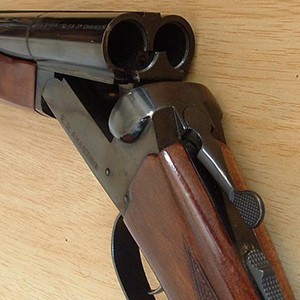
This may be a common mistake committed by new gun owners, and it is one of the biggest mistakes you can commit. There are several things that could happen if you forget to do this. You can shoot yourself, someone in your family or someone in the bath of the bullet. This could not only result in injury, but also lead to someones death.
Every month there are cases of shootings that are caused by negligent discharge of a weapon while cleaning. You should be in the habit so that every time you pick up a weapon you check to see that it is unloaded. Every time!!!
Always keep your ammunition separate from your gun cleaning area, never mix the two!
2. Don’t Forget to Clean the Insides
When disassembling the gun for cleaning, you need to clean and oil all moving parts. Because the internal parts have oil on them, every time you fire more shtuff is collected in that oil. At some point it will cause the gun to malfunction because the small parts cannot work as they were intended. The Best case is that this will only require you to disassemble it again and clean re-oil those parts. The Worst case is that you were trying to defend yourself or your family and the gun does not fire.
3. Don’t Leave Too Much Oil in the Bore
This is also a common mistake committed by many gun owners when they clean their gun. It usually happens when the gun owner is using too much liquid solvent which led to over-lubrication when cleaning. Once the bore is clean, run a lightly oiled patch through the bore to prevent rust. To be sure there isn’t too much oil in the bore before firing, run a dry patch through the bore just before firing on the range or just before you leave the house.
Having too much oil in the bore, can cause malfunctions when firing the gun and damage the barrel and other metal parts.
4. Don’t Clean the Gun Before You Understand It
Gun cleaning should not be taken lightly, so it should take some time to understand your gun’s mechanism before you start cleaning it. If you own an automatic pistol such as a Glock or a Beretta 92F, take some time to read the manual and find out the proper way to disassembly and reassemble. It is also helpful to research about your particular gun model online to learn how similar guns were cleaned by other people, what products they used, etc.
One of the first things you should do after purchasing your gun is read through the owners manual, several times. Become familiar with the parts and their names. Most guns have instructions on how to field strip the gun for field cleaning. Field strip your gun and put it back together. Watch how the parts work together.
Look on the gun manufacturer’s site or YouTube for instructions on field cleaning your gun. Watch the videos. Take a local course on gun cleaning where they have you bring your gun to class for cleaning.
5. Don’t Use the Wrong Cleaning Solvents
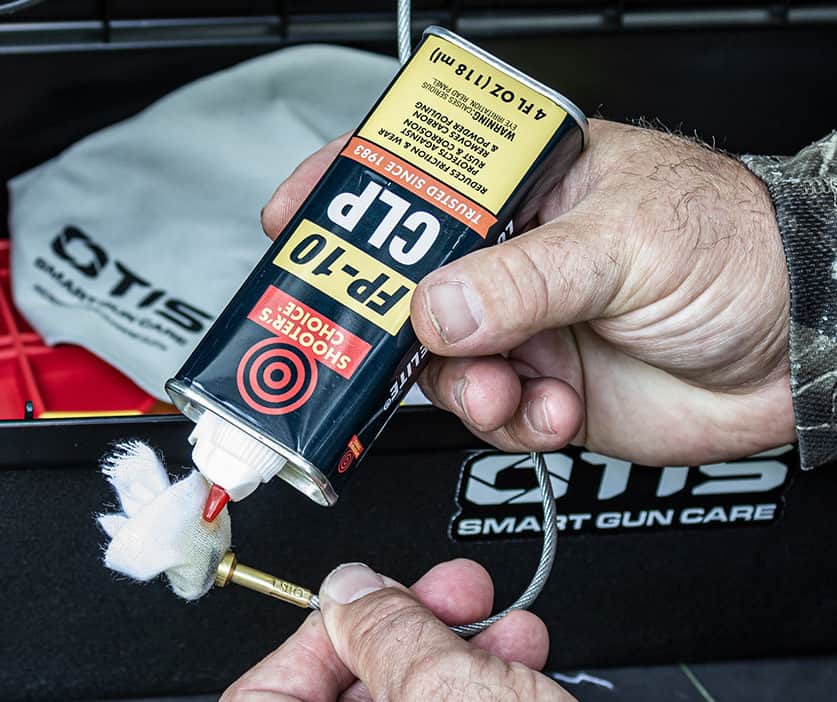
The key here is choosing the right solvent for your gun’s caliber/gauge/action. Always read the owner’s manual, but in most cases you can use regular gun oil for light surface cleaning. If there is heavy carbon buildup or powder fouling, then you might want to use solvent that is designed to clean semi-automatic pistols. For very dirty firearms that have heavy carbon buildup and powder fouling, you should use a strong bore cleaner such as Hoppe’s No. 9.
Don’t use WD-40 for cleaning your guns, read this to learn why.
6. Don’t Use the Wrong Tools
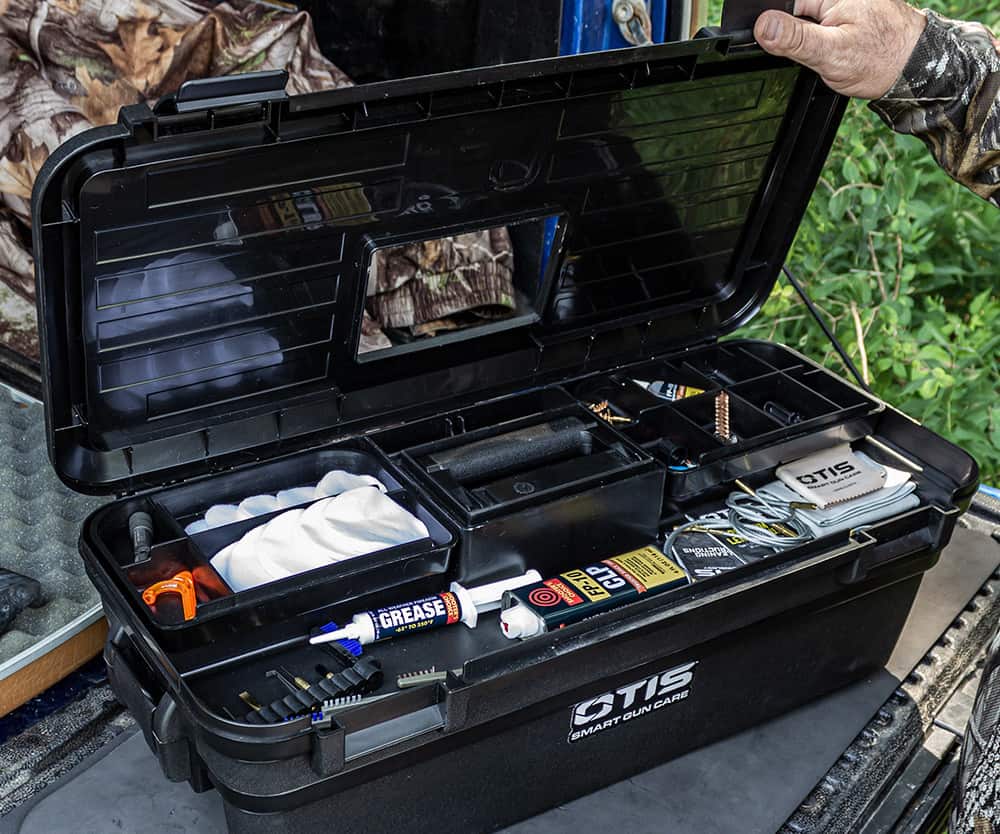
A proper gun cleaning kit should include a few cleaning rods or bore snakes, bore brushes (bronze or nylon for rifles; phosphor bronze or nylon for shotguns/pistols), jags (for using patches/cleaning cloths), loop (for cleaning patches/cotton), and maybe some nipple pick (for flintlock owners). Usually, I use a bronze bore brush for heavy-duty gun cleaning. Use cotton patches wetted with solvent for smaller parts such as the inside of the barrel; and wetted patches or jags for larger parts such as the receiver.
When I grew up in the 70’s we didn’t have access to all of these great gun cleaning kits available today. We had a gun cleaning rod with a loop and would use old cotton t-shirts or flannel shirts for the patches. Of course, we had Q-tips and toothbrushes that could also be used for cleaning.
7. Don’t Start Gun Cleaning Without Everything You Need On-hand
Be sure you have enough gun solvent and gun oil to finish the job, once you start. Have plenty of the right size patches on had to not only clean the gun but then to also put that fine light oil finish in the bore. Make sure you have the time that you need to clean the guns, as well. There is no hurrying up this type of project.
How much of the solvent, oil, and patches that you need will also depend on why you are gun cleaning that day. Are you just doing your monthly gun cleaning maintenance? That will take a lot less materials than if you are cleaning the guns after shooting on the range for several hours.
Did you go out on a hunt in the rain? I hope you took out a field gun cleaning kit so you could dry it and oil it right after you were finished and before you put the gun in the case. Then you must follow-up with a good cleaning once you get home.
Bottom line is, have everything on hand well in advance of needing it.
8. Don’t Forget the Last Step of Oiling the Gun
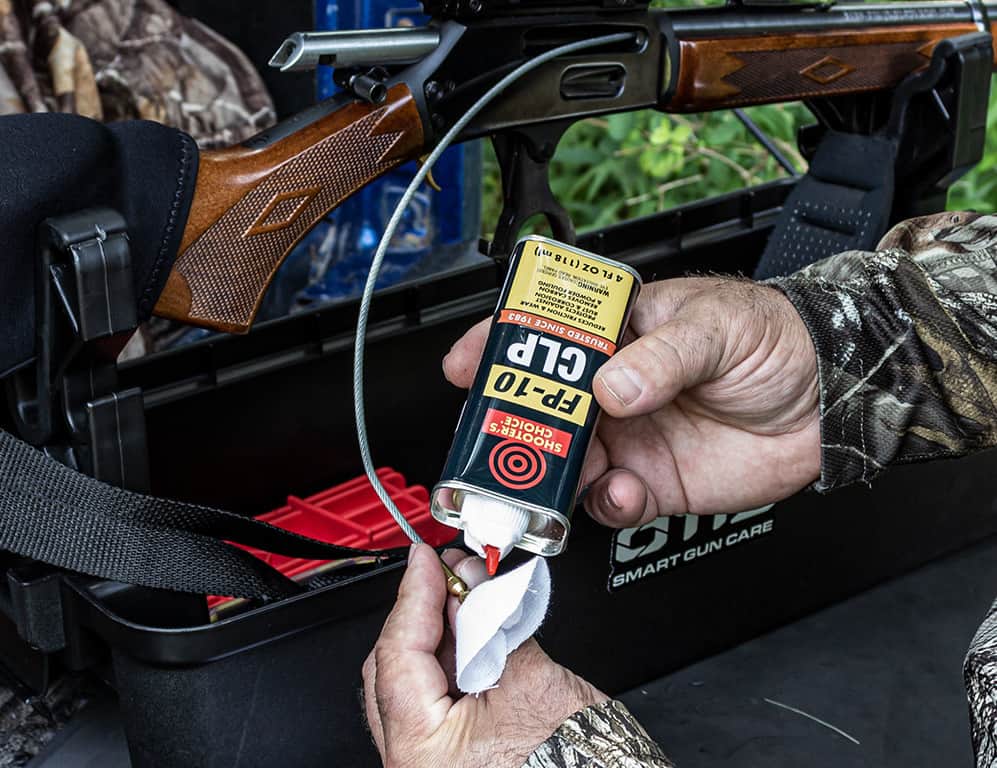
Once you’ve finished cleaning the gun, you need to apply oil. As you inspect and put together the different gun groups there should be a light coat of oil on them.
The last step with the bore is putting a patch through it with a light amount of oil on it.
And, once the gun is assembled and ready to be put away a light coat of oil on the outside of the metal pieces to protect them from moisture until the next use or cleaning.
9. Don’t Leave Your Eyes Unprotected
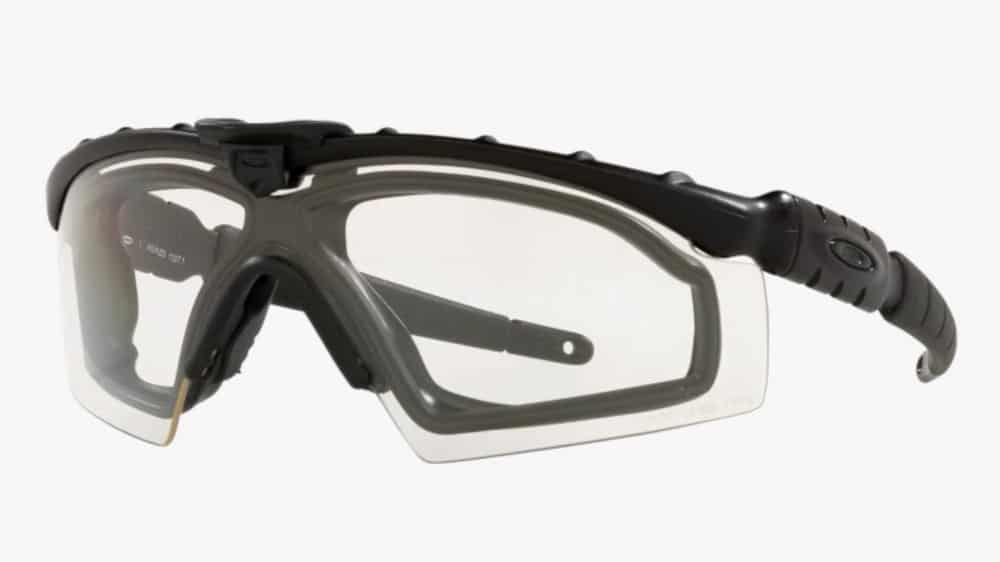
When cleaning firearms, you will be dealing with bore brushes and other materials that can damage your eyes if they hit them. Always wear protective eyeglasses or goggles when using homemade rods for gun cleaning (e.g., broken handle of a toothbrush, wooden dowel rods, etc.) or when using gun cleaning solvents or oils. Sometimes when we aren’t careful enough springs and small parts could go flying in any direction and you don’t want your eyes to be what stops them.
Some solvents come in aerosol sprays and oils are liquids that can spatter and fly unexpectedly.
We’ve only got two eyes, so we need to take care of them. How else are we going to hit our target? Plus if you look at the link to the article in the paragraph above you will see that protective shooting glasses can double as protection for your eyes when cleaning your guns.
10. Don’t Let Your Hands be Unprotected
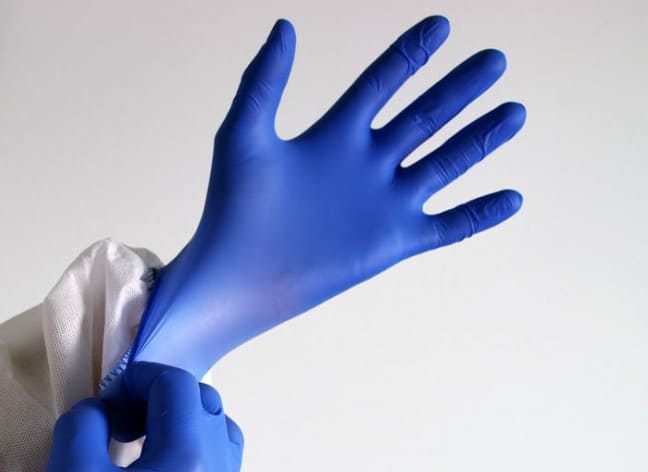
Your hands will come in contact with a lot of chemicals in the process of cleaning your guns. There is the lead that is left over from firing lead rounds. There are the various chemicals used in the making of the gun solvents and oils. So, be sure to protect them, as well. Even if you are wearing gloves while you clean your gun (like I do), make sure to wash your hands before and after cleaning your gun after using solvents and oils.
Something else to consider is that you are protecting the finer gun parts and gun metal from the natural oils and minerals that come from your own skin. So, it’s a two-way street in that you are protecting your hands and you are protecting your guns.
Oh, by the way, I use the same gloves for gun cleaning as I do when filling up for gas. Ever since Covid-19 has started I’ve bccome more aware of protecting myself from other people’s germs and viruses. Imagine this, the person filling up with gas sneezes and catches his sneeze in his hands. His tank is full and he puts his hands on the gas handle to take it out of the tank. Ewww!!!
I’m always using gloves to fill up my tank these days, it protects me from getting sick and from the chemicals and gas compounds that could be on it. How about you?
FAQ
Which part of the rifle should not be oiled?
The ammunition should not be oiled, as it can cause malfunctions. Keep the ammunition and firing chamber clean and free of oil or grease for safe and reliable shooting.
How often should I oil unused guns?
Unused guns should be lightly oiled and stored in a dry environment to prevent corrosion. Check and re-oil them every few months or follow the manufacturer’s recommendations.
Does oil rust guns?
Improper or excessive use of oil can trap moisture and lead to rust on guns. Use the right amount of high-quality gun oil to protect the firearm without causing rust.
Can you use Vaseline to clean your gun?
No, Vaseline is not suitable for cleaning guns. It is not a proper gun lubricant or solvent. Use specialized gun cleaning products for proper maintenance and avoid damaging the firearm.
Should I oil my rifle stock?
It’s unnecessary to oil a wooden rifle stock regularly. However, applying linseed oil or tung oil occasionally can preserve and enhance the appearance of the stock.
Should you lube the bolt on a rifle?
Yes, the bolt on a rifle should be lubricated regularly. Use a light gun oil to ensure smooth operation and prevent excessive wear on moving parts.
Can I clean my gun with baby oil?
No, baby oil is not meant for gun cleaning. It lacks the necessary properties to properly clean and protect firearms. Use dedicated gun cleaning products for effective maintenance.
